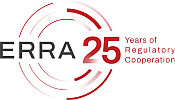Saudi Electricity Regulatory Authority (SERA)
Saudi Electricity Regulatory Authority (SERA)

Saudi Arabia
Sectors Regulated:
Electricity
- PO Box 4540
11412 Riyadh; Kingdom of Saudi Arabia - +966 11 201 9000
- info-at-wera.gov.sa
- https://sera.gov.sa/
Regulatory Authority General Information
- Joined ERRA in 2008 (became Full Member in 2016)
- Established in 2002
Responsibilities
- Legal basis/ mandate
- Electricity Law promulgated by Royal Decree no. (M/56) on 22 November 2005.
- Responsibilities
- The Authority’s Charter has charged it with a number of specific responsibilities. Article 3 of the Charter lists sixteen specific responsibilities that fall into four major groupings:
1. Supply Matters: dealing with license issuance, monitoring of license compliance, development of unified utility accounting procedures, coordination of organized infrastructure, and a services expansion plan.
2. Consumer Issues: dealing with tariff assessments and their periodic review, stakeholder protection, investigating and resolving complaints by involved parties, improving sector performance, and in coordination with the Ministry of Water and Electricity, promoting energy conservation measures.
3. Technical Issues: developing technical standards of performance for each electrical activity, monitoring compliance with the standards, ensuring adequacy of the industry’s R&D activities, and other relevant technical matters.
4. Organizational and Administrative Tasks: defining public interest, development of regulations for infrastructure expansion, encouraging private sector investments, assessing licensing fees and penalties for non-compliance with licenses and/or the Authorities orders, and issuance of periodic reports by the Authority to the Council of Ministers on cost and tariffs of electricity services.
Organisational Structure
- Internal Structure
- SERA is supervised by a Board of Directors chaired by the Minister of Water and Electricity, with the Governor of the Authority as deputy chair, six members from senior government officials representing the ministries of Water and Electricity, Finance, Petroleum & Mineral Resources, Commerce & Industry, Economy & Planning, and the Saline Water Conversion Corporation (SWCC); and five members selected on their own merits.
- Working Employees
- • Decision-Making Level: 1
- • Total Number of Employees: 155
- Budget
- Is financed through License fees.
Annual Report
Information will be available at a later stage.

